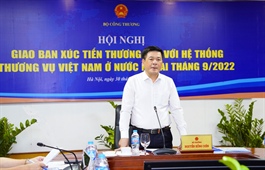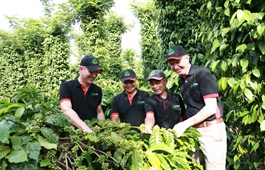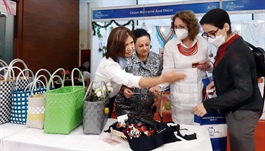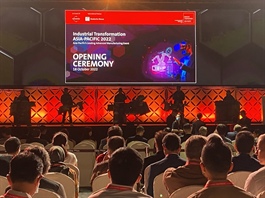Public and private sectors partner to reduce emissions for sustainable agriculture
Public and private sectors partner to reduce emissions for sustainable agriculture
Within the framework of the Partnership for Sustainable Agriculture in Vietnam (PSAV), the Ministry of Agriculture and Rural Development (MARD) and Nestlé Vietnam organised a conference on Regenerative Agriculture: The Practical Solutions to Reduce Emissions and Develop Sustainable Agriculture.
Over 100 representatives from government agencies, international organisations, and businesses discussed solutions aiming for a green and low-emission agriculture that adapts to climate change.
Addressing the conference, Le Quoc Doanh, Deputy Minister of Agriculture and Rural Development, said that agricultural production had obtained remarkable achievements lately. Its biggest achievement has been ensuring the national food security and developing the commodity agriculture with a significant position in the region and in the world.
“After the pandemic, the agriculture sector has been able to demonstrate its role as the pedestal of the economy in difficult times as ensuring the supply of food and essential goods is an important basis for the implementation of security and people’s safety,” Doanh said.
However, despite these positive contributions, agricultural production, is a source of emissions. Notably, nearly 70 per cent of CO2 emissions come from cultivation activities.
To bring the commitments made at COP26 into action, in January, the MARD submitted to the government the Strategy for Sustainable Agriculture and Rural Development for the 2021-2030 period, with a vision to 2050, that was approved by the prime minister.
According to Doanh, the MARD is also developing a plan to reduce greenhouse gas emissions in agriculture and rural development in the 2021-2030 period, with a vision to 2050.
The conference participants agreed that the implementation of Vietnam’s international commitments as well as the deployment of the Strategy for Sustainable Agriculture and Rural Development require great efforts not only from the government but also from the private sector and organisations that directly participate in the implementation at varying scales, to unlock investment resources of the whole society.
Attending the conference as part of a business trip to Vietnam, David Rennie, deputy executive vice president and head of Coffee Brands at Nestlé Group, highlighted, “Climate change is one of society’s greatest challenges. It is also one of the greatest risks to producing the ingredients that go into our food and beverage products. We are acting now to become a net zero company and accelerate the move towards regenerative food systems at scale. Today, we would like to share about the regenerative agriculture approach and why regenerative agriculture is a key part of Nestlé’s net zero roadmap.”
Rennie added, “We have just announced the Nescafé Plan 2030, the sustainability ambition and regenerative agriculture journey for our largest coffee brand Nescafé. We are working with farmers to help them transition to regenerative coffee farming practices and to look for the best tailored solutions that are right for their regions and crops.”
As the co-chair of the PSAV and the Production Sub-Committee of the Coffee Industry, as well as a pioneer in the private sector, Nestlé Vietnam expressed its desire to accompany the government and other departments in promoting regenerative agriculture.
Nestlé Vietnam's Nescafé Plan is currently being implemented in four central provinces where the regenerative agriculture model is being applied, a crucial part in reaching the country’s ecological agriculture goal.
During the conference, Nestlé Vietnam’s representatives shared not only its experience and achievements of the plan but also initiatives in regenerative farming, as well as replicable best practices towards the green and low-emission agriculture that adapt to climate change.
The conference was held in the context of Vietnam aiming to restructure and promote the agricultural sector as quality-and value-based, enabling the country to become a transparent, responsible, and sustainable food supplier for the world.























